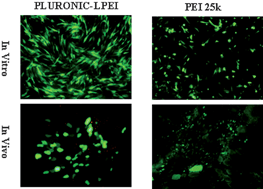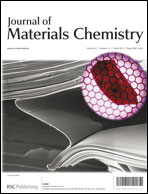High efficiency and low toxicity of polyethyleneimine modified Pluronics (PEI–Pluronic) as gene delivery carriers in cell culture and dystrophic mdx mice†‡
Abstract
A series of low molecular weight polyethyleneimine (LPEI) conjugated Pluronic copolymers (PCMs) were synthesized and evaluated in C2C12 myoblasts and CHO cells in vitro and in dystrophic mdx mice in vivo as gene delivery carriers. Pluronics with different molecular weights (Mw) and hydrophilic–lipophilic-balance (HLB), and two LPEIs (Mw: 0.8k, 1.2k Da) as composition of PCMs have been synthesized, and the dynamics between the structures and properties were investigated. The conjugation efficiency of PEI ranged from 77.5–95.4% with relatively higher levels of PEI conjugation to the Pluronic size in PCMs, with the Pluronics of smaller size achieving relatively higher levels of PEI conjugation. Almost all of the PCM polymers were able to bind and condense plasmid DNA effectively into particles of approximately 200 nm in solution at the polymer/DNA ratio of 2 and above. The PCMs composed of relatively moderate size (Mw: 2000–5000 Da), intermediate HLB (12–23) of Pluronics, and LPEI produce much higher gene delivery efficacy and less cytotoxicity as compared with PEI 25k in C2C12 myoblasts and CHO cells in vitro. The PCMs were also able to enhance gene delivery in mdx mice in vivo, indicating their potential as biocompatible gene delivery carriers.


 Please wait while we load your content...
Please wait while we load your content...